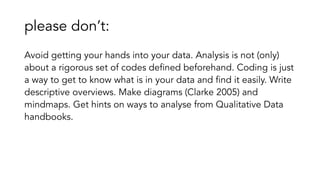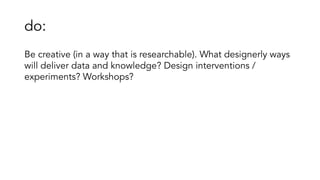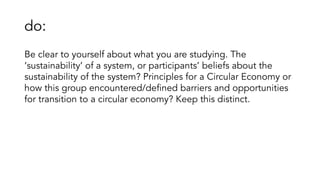Emerging practices of making/production
- 1. 2017 PhD SUMMER SCHOOL CONCEPTS AND CONTEXTS OF DESIGN FOR SUSTAINABILITY Cindy Kohtala, Postdoctoral researcher Espoo Mini Maker Faire October 2015
- 2. Emerging practices of making/production ISSUES AND INTERVENTION CONTEXTS Fablab Amersfoort August 2016
- 3. recommended reading. tricks on how to get to the essence of your topic (not to over-romanticize or over-emphasize the ‘new’ and ‘emerging’ characteristics of the phenomenon you are studying)
- 4. Even war is ‘emerging.’ And with emerging phenomena, with projects that unfold, there is a history.
- 5. Helsinki Hacklab May 2015 What of the history of the movement do you need to know and explain? Relatedly, you need to observe how the ‘marginal’ and emerging meet the mainstream and institutional. How do things and practices become infrastructure?
- 6. DISCOURSE IDEALS VISIONS FRAMINGS IDEOLOGIES IMAGINARIES à REPRESENTED PAST à DESIRED FUTURE Aalto Fablab 2013
- 7. mass fabrication: transformed supply chains, elimination of embodied energy of redundant intermediaries mass customization: less pre-consumer waste, greater potential for re-manufacturing, “eco-guiding” configurators for consumers bespoke fabrication: localized production and lower transport emissions, less product replacement personal fabrication: localized production, higher environmental impact per unit but overall lower volumes (than MP and MC) ENVIRONMENTAL BENEFITS exploit user/consumer input exploit scale exploit modularization exploit small and local ensure quality for attachment, satisfaction exploit learning opportunities Kohtala, Cindy. 2015. ‘Addressing Sustainability in Research on Distributed Production: An Integrated Literature Review’. Journal of Cleaner Production 106: 654–668. doi:10.1016/j.jclepro.2014.09.039. How researchers conceive the future of distributed production and its sustainability issues.
- 8. Kohtala, Cindy, and Sampsa Hyysalo. 2015. ‘Anticipated Environmental Sustainability of Personal Fabrication’. Journal of Cleaner Production 99: 333–344. doi:10.1016/j.jclepro.2015.02.093. And there are sustainability issues. How will you study them?
- 10. What is observable? Formulate your research question according to what you can access and what information / knowledge / data you can glean.
- 11. Analysis is not only ‘coding’. Use many methods: diagrams, narratives, descriptive overviews – to know your data and its main themes. Coding is useful for knowing what is in your data and finding things in it – but use coding – don’t let coding rule and debilitate you.
- 12. mainstream books (that happen to be based on research). Don’t only cite these claims – go to the studies cited.
- 13. please please don’t: Cite ‘should be’ as ‘is’.
- 14. please please don’t: Cite ‘should be’ as ‘is’. Cite (only) the blah blah blah. What studies is the blah blah blah based on?
- 15. please please don’t: Cite ‘should be’ as ‘is’. Cite (only) the blah blah blah. What studies is the blah blah blah based on? Misrepresent studies and overgeneralize findings on SCP. Check the product category, demography, study aim....
- 16. please please don’t: Romanticize. Don’t use the same ‘gush’ ‘ihana ihana’ tone as mainstream books.
- 17. please please don’t: Romanticize. Don’t use the same ‘gush’ ‘ihana ihana’ tone as mainstream books. Catalogue and inflate. Don’t choose only a few niche examples as ‘cases’ (usually overused anyway) and expect them to represent something significant. Be explicit about your case choice and what it represents/doesn’t represent.
- 18. please don’t: Avoid getting your hands into your data. Analysis is not (only) about a rigorous set of codes defined beforehand. Coding is just a way to get to know what is in your data and find it easily. Write descriptive overviews. Make diagrams (Clarke 2005) and mindmaps. Get hints on ways to analyse from Qualitative Data handbooks.
- 19. please don’t: Avoid making memos or notes about data collecting or analysis.
- 20. please don’t: Avoid making memos or notes about data collecting or analysis. Hide your data or analysis process in papers. Spell it out.
- 21. do: Formulate your research question according to what you are actually studying and able to study. What can you access?
- 22. do: Formulate your research question according to what you are actually studying and able to study. What can you access? Choose your terminology ‘xx’ according to the field you are aligning with. Be clear and honest with yourself: when I am studying xx, what does that mean in terms of data collecting, and how do I observe it in my data?
- 23. do: Be creative (in a way that is researchable). What designerly ways will deliver data and knowledge? Design interventions / experiments? Workshops?
- 24. do: Be creative (in a way that is researchable). What designerly ways will deliver data and knowledge? Design interventions / experiments? Workshops? Be clear and explicit about what ‘sustainability’ is. Choose a definition and principles. Use better, more exact phrases (transition to a more sustainable society, less negative environmental impact, more equity in access to resources...).
- 25. do: Be clear to yourself about what you are studying. The ‘sustainability’ of a system, or participants’ beliefs about the sustainability of the system? Principles for a Circular Economy or how this group encountered/defined barriers and opportunities for transition to a circular economy? Keep this distinct.
- 27. HCI, Science and Technology Studies, design research hacker identity care and maintenance (of community) qualitative data: interview study of hacker projects 19-month ethnography in a hackerspace analysis of issues in a forum listserv lens of care ethics
- 28. HCI, Science and Technology Studies, design research hacker identity care and maintenance (of community) qualitative data: interview study of hacker projects 19-month ethnography in a hackerspace analysis of issues in a forum listserv lens of care ethics Mota: Social Shaping of Technology comparative analysis of the ethoi, practices and implications of the broadcast and distributed approaches original account of the origins, practices and characteristics of the European and North American DIY hardware communities: 1) analytical descriptions of the maker, hackerspaces and open source hardware communities, as well as of their cultural origins and histories; 2) a study of their ethos and motivations; 3) an analysis of their technological design and dissemination practices; 4) and an examination of how their practices enable citizen participation in the shaping of technologies data: literature review, ethnographic methods, first person accounts, and the analysis of documents and technological artifacts
- 30. Symbolic Interactionism ethnographic data interviews ‘expert’ participatory design workshop literature review how sustainability is represented how ’sustainable’ can this phenomenon be
- 31. Design Research, Interaction Design, Participatory Design opening of production What kind of co-production practices are emerging in the opening of production? To what kind of (alternative) futures do they relate? Which of them may move forward as possible presents? How can design be at play in co- production practices as a matter of making possible presents? commons, commoning, infrastructuring Symbolic Interactionism ethnographic data interviews ‘expert’ participatory design workshop literature review how sustainability is represented how ’sustainable’ can this phenomenon be
- 32. Use diagrams to map your literature and positioning. This is useful for yourself and your readers.
- 33. Explain and justify your methods. Why these ones – and not others?
- 34. functionalist, instrumentalist, objectivist interpretivist, constructionist, constructivist MACRO unit of analysis conceptualizations propositions MICRO unit of analysis experiments materializations visions scenarios models frameworks technical experiments critical making experiments design experiments RESEARCH THROUGH DESIGN RESEARCH ON DESIGNRESEARCH FOR DESIGN descriptions, interpretations of phenomena narratives ethnographic accounts surveys interviews


































